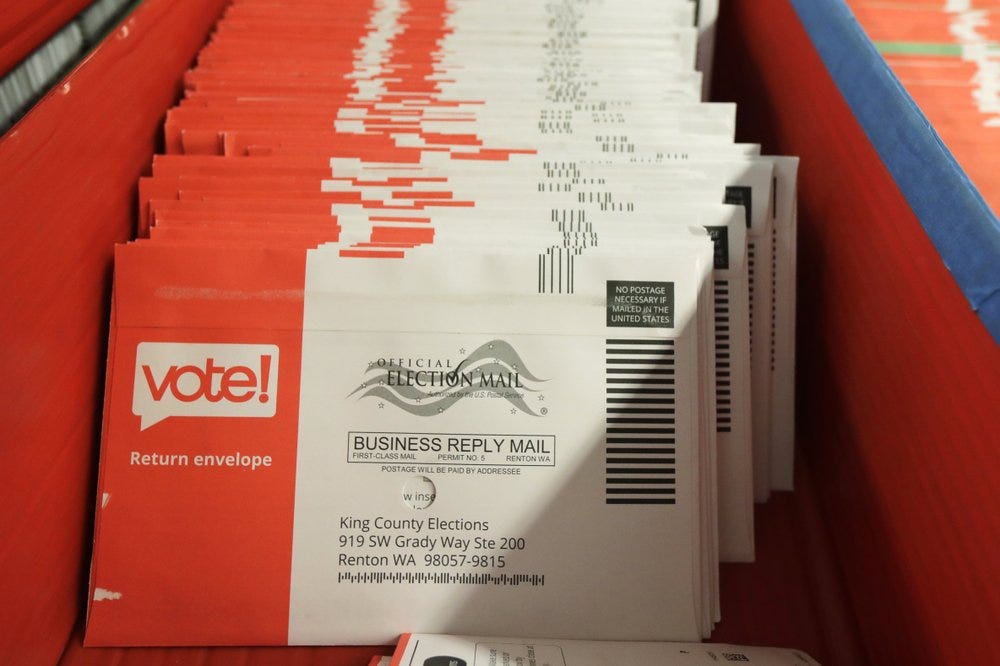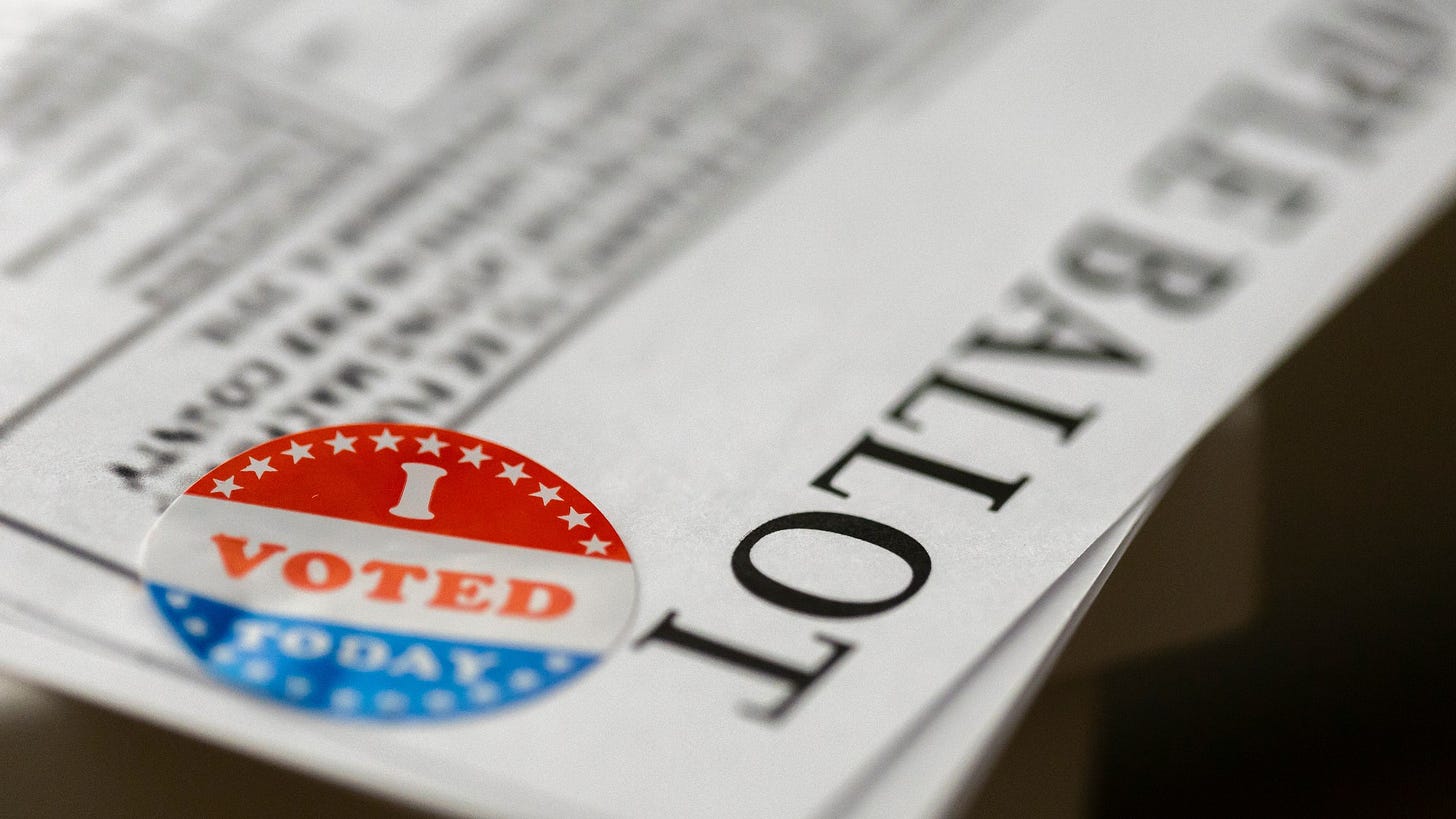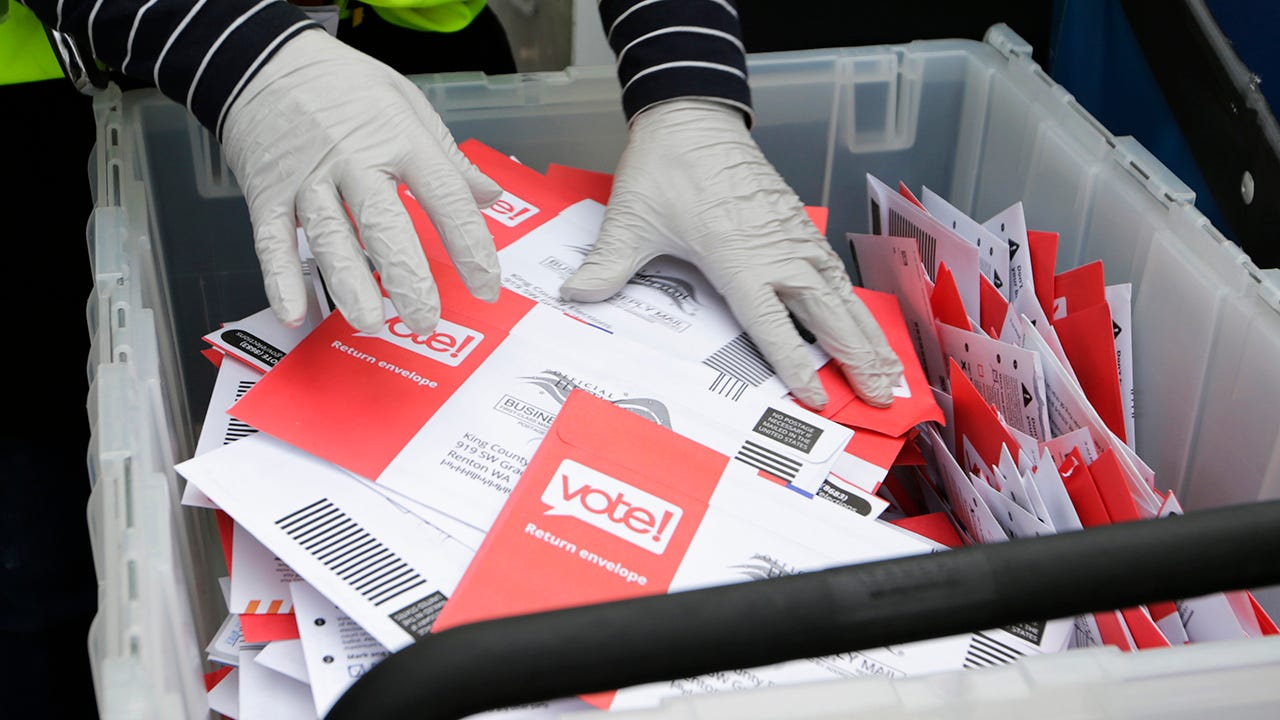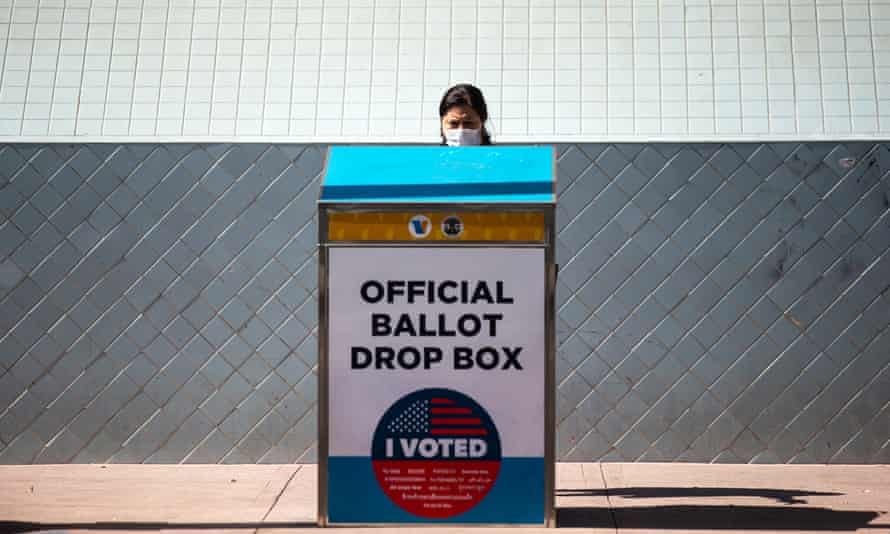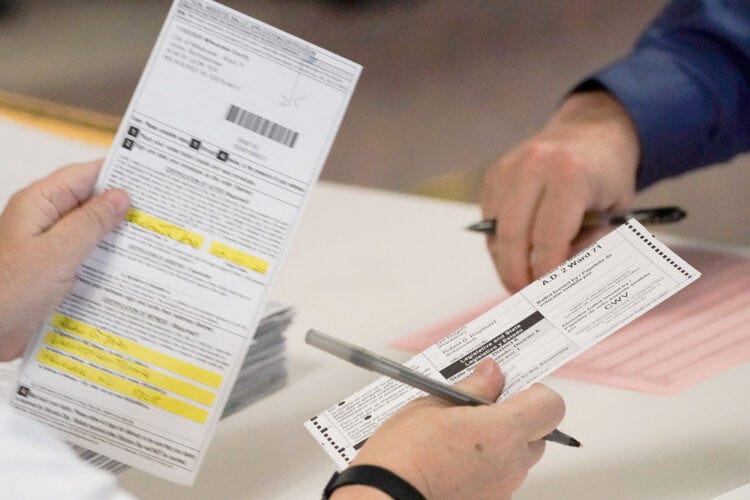Ballot security is a serious problem in the USA
And it is not just about the 2020 Presidential election
This post is not about whether Biden or Trump actually won the 2020 election!!!! Just get the issue out of your mind. It is about a far more serious issue.
Ballot security is a serious problem in the United States, and it has been ever since the founding of the Republic. In a previous article, I wrote about ballot fraud in American history, but for today I would like to address a more contemporary issue.
A poll in 2023 by Rasmussen (a very respected and non-partisan polling institution) concluded that 21% of mail-in voters stated that they committed an act that was legal ballot fraud in the 2020 election. Since roughly 30% of voters in the 2020 election voted by absentee or mail-in ballot, this leads to an overall total of 6.3% who admitted to unknowingly committing such acts. The Margin of Sampling Error of the poll was +/- 3 percentage points with a 95% level of confidence.
To be clear, the poll did not ask “Did you commit ballot fraud?” Obviously, the vast majority of that 6% would have said “No.” Instead, the pollsters asked a series of questions about whether they committed acts that are illegal in some (all?) states.
Here is the actual wording of the relevant questions in the poll:
”We are now going to ask you several questions about voting in the 2020 Presidential election. Your responses will remain anonymous, so please answer honestly.
Who did you vote for in the 2020 Presidential election?
Did you vote with an absentee or mail-in ballot in the 2020 election?
(Answered by the 30% of respondents who voted by absentee or mail-in ballot): During the 2020 election, did a friend or family member fill out your ballot, in part or in full, on your behalf?
During the 2020 election, did you fill out a ballot, in part or in full, on behalf of a friend or family member, such as a spouse or child?
(Answered by the 30% of respondents who voted by absentee or mail-in ballot): During the 2020 election, did you cast a mail-in ballot in a state where you were no longer a permanent resident?
During the 2020 election, did you sign a ballot or ballot envelope on behalf of a friend or family member, with or without his or her permission?
(Answered by all): During the 2020 election, did a friend, family member, or organization, such as a political party, offer to pay or reward you for voting?
Do you know a friend, family member, co-worker, or other acquaintance who has admitted to you that he or she cast a mail-in ballot in 2020 in a state other than his or her state of permanent residence?
Do you know a friend, family member, co-worker, or other acquaintance who has admitted to you that he or she filled out a ballot on behalf of another person?
I have a PhD in Political Science and have worked on several official polls. I was not formally trained in polling methodology, but I have read several books about the subject. I have also written questions for polling firms.
I think that the questions in this poll were well-crafted and presented in the correct order. I do not see any reason to doubt the overall results.
It is important to note that as you shrink the sample size, the margin of error rises, so the 6.3% who admitted to committing one of the above acts is probably somewhere between 2 and 12 percent. Either way, this is well within the typical margins of competitive elections for U.S. House, U.S. Senate, Gubernatorial, and state legislative races. It is also well within the margin for the popular vote for Presidential elections and swing states in the Electoral College, which indirectly determines the outcome of Presidential elections.
It is unclear how Rasmussen calculated the 21%, but it appears to be anyone who answered YES to any of the following questions listed above: 3, 4, or 6. It is also unclear whether Rasmussen checked the laws for each of the states of the respondents or filtered out any respondents who answered Yes in states where the practice was legal.
I must confess that I do not know the exact wording of the ballot laws for each state. It is possible that all states make those three acts illegal. It is also possible that only some states do, so some of those respondents may not have committed an illegal act.
Regardless these results are extremely troubling. The entire point of a secret ballot is to ensure that voters are not unduly swayed by other people during the actual act of voting. Political discussions before the act is expected and desirable, but not during the act of voting.
I am sure that some people will say “What is the big deal? We do not know if it actually changed anyone’s vote or influenced the outcome.”
While it is true that we do not know the impact of these behaviors on election outcomes, these laws were created for a reason. Electoral laws were written so that people with strong political opinions cannot influence people with less (or no) political opinions while they are actually voting.
It is also possible that ballot fraud by one side is offset by equal amounts of ballot fraud by the other side in the same election. That seems possible in any one race, but what about when you include dozens of competitive Congressional races and hundreds of competitive state legislative races? There is no way that ballot fraud does not impact election outcomes if it is widespread as the Rasmussen poll suggests.
Ballot laws must balance voter convenience with the integrity of the electoral system. We could just leave blank ballots at libraries, courthouses, and other public facilities and just have people fill out the ballots and drop them off. We do not do this because we know that this makes it far too easy for bad actors or simply just over-zealous actors to commit ballot fraud.
We have in-person voting because it decreases the chances of a person unduly influencing another person during the act of voting. We also do so to reduce the chances of ballot stuffing (a worse form of ballot fraud that was not addressed in the survey).
Our electoral process is there for a reason
Following the highly contested results of the 1884 Presidential election, virtually all states implemented the so-called Australian ballot to limit opportunities for ballot fraud. The key characteristics of Australian ballots were:
identical blank ballots were printed by the local government at public expense,
the blank ballots displayed all nominated candidates
ballots were distributed only at the polling place
voters marked their ballot in secret at the voting precinct.
These reforms were implemented because ballot fraud over the previous century was systemic. From the founding of the Republican until 1884, elections were conducted in a very different manner:
Ballots were not printed by governments. Instead, partisan newspapers typically printed pre-filled-out ballots. It is not clear to me that voters even had the option of starting with blank ballots.
Voters cast ballots in full view of local party representatives. Typically, only one party had representatives at the voting precincts: the majority party.
Ballots were often colored, so it was very easy for local party representatives to see who voted for the opposition party. Because most neighborhoods were tight-knit, it is likely that the voter and the local party representative knew each other and could easily recognize each other.
Ballots often gave no ability to vote for:
third parties,
independents
minority factions within the party that fail to get the nomination
mix-and-match Democratic and Republican candidates.
Because local party representatives played an important role in which individuals received government services, the economic cost of voting for the opposition might be substantial.
Voters from minority ethnic, racial, or religious groups were under significant pressure to either not vote or vote for the majority party in the region.
It is not difficult to see how this electoral system was vulnerable to massive fraud. To be fair, it is quite likely that the majority party would have won the vast majority of the elections anyway, but electoral support for opposition candidates would be seriously undermined by fear of reprisal. It would take very widespread popular anger by the majority of voters to overcome the institutional bias in this process.
And even then ballot fraud could still be easily implemented when all ballots are already pre-filled and look exactly the same. A local party official could just drop in an extra thousand ballots when no one was looking, and it was impossible to prove that anything went wrong.
This is exactly why electoral fraud was endemic during this period, and why the Americans saw the need to implement electoral reforms.
We are unintentionally reversing past reforms
The trend over the last 20 years has been to make voting more convenient to increase turnout. This trend has been pushed particularly hard by Democrats who are convinced that non-voters would vote for them if given the chance. Radically expanding absentee and mail-in ballots seem like a fair method for doing so.
This trend towards expanding alternative means of voting accelerated rapidly in 2020 because of the obvious potential risks of face-to-face contact. It was a legitimate concern that fear of getting Covid would depress turnout and those additional non-voters would skew the results. So many Democratic-controlled state legislatures liberalized voting rules as an emergency action.
Those who support this trend implicitly made ballot security a lesser value. It has become fashionable to insist that absentee ballots, mail-in ballots, and exterior ballot boxes are just as secure as on-site voting.
It is pretty clear that the results of this survey blow this theory out of the water. True, the pollsters did not ask on-site voters the same question, but I think that it is pretty obvious that if they did the results would be near zero (which is exactly why they did not ask the question in the first place).
I believe that the results of this poll prove that the rapid expansion of absentee ballots and mail-in ballots are far more subject to ballot fraud than on-site voting. If someone disagrees with me on this, leave a comment.
And this really matters because:
We have a federal government that disperses trillions of dollars every year. That is a huge temptation to use ballot fraud to increase one’s control over that money.
The federal government keeps growing in relative power with every decade.
The two major parties are moving further and further from each other on policy preferences, so the outcome of elections has a very real impact on public policy.
We have a polarized political culture where trust in the other side is rapidly declining. If we have an electoral process that is perceived as enabling ballot fraud, this further decreases trust in the legitimacy of the final outcome.
Most importantly, if partisans think the other side is committing ballot fraud, then this gives them the incentive and the excuse to do more of the same. This risks creating a downward spiral of ballot fraud with trillions of dollars per year at stake.
If we had a political system with a weak federal government and relatively moderate parties, then one could argue that the consequences would be much less. But that is clearly no longer the case.
Our current system makes every competitive election potentially determined by ballot fraud with little way to determine whether ballot fraud happened after the fact. In such a system, it is impossible to know who really won the election, even after the votes are recounted.
If we apply this to the 2020 Presidential election, there is no way to know who really won the election, regardless of what Trump, Biden, the Democratic party, or the Republican party say. Ballot fraud was bigger than the voting margin.
If we were to apply the same voting process to previous Presidential elections, we would not really know who won in 2016, 2004, 2000. Each of those elections had an electoral college and popular vote well within the margin of ballot fraud identified in the poll. Even the Obama win in 2012 is likely within the margin of ballot fraud.
This also makes it very likely that ballot fraud will be larger than the vote difference in the 2024 Presidential election as well. And this does not even include the margins for competitive elections for U.S. House, U.S. Senate, Gubernatorial, and state legislative races. Every competitive race is open to being determined by ballot fraud.
That is not a good place to be!
We seriously need to reign in the following practices:
Absentee ballots
Mail-in ballots
Exterior ballot boxes
Ballot harvesting
The inconvenience of voters having to physically go to polling stations is simply not worth destroying the integrity of our elections. The radical expansion of absentee ballots and mail-in ballots now look like yet another well-intentioned experiment that had more negative consequences than positive consequences. Both should be only for cases of clear need, and ballot harvesting should be eliminated.
I know that there are some Democrats that will be unwilling to accept this proposal because they perceive that the current practices benefit their party. Remember that if we keep this current process in place, your preferred candidates will sometimes (often) lose to ballot fraud. The current process may temporarily benefit your favored candidate, but it might later be used by your opponents to better effect.
Is that what you really want?
As usual, the rules for commenting are as follows:
Read the entire post first
Keep the comment on the same topic as my post.
This post is not about whether Biden or Trump actually won the 2020 election!!!!Be respectful.
If you break the rules, I may block you or delete your comments.



